"A sign of hope": Peter Mertens on the results of the elections
"The PVDA-PTB's recent election result is a strong sign of hope for all the future struggles of the working class and young people. The PVDA-PTB has doubled its number of elected representatives in Flanders, made strong gains in Brussels and is the most resilient left-wing party in Wallonia," said Peter Mertens. In this interview, conducted two weeks after the elections, the PVDA-PTB General Secretary takes a detailed look at the election results and the lessons that can be drawn from them.
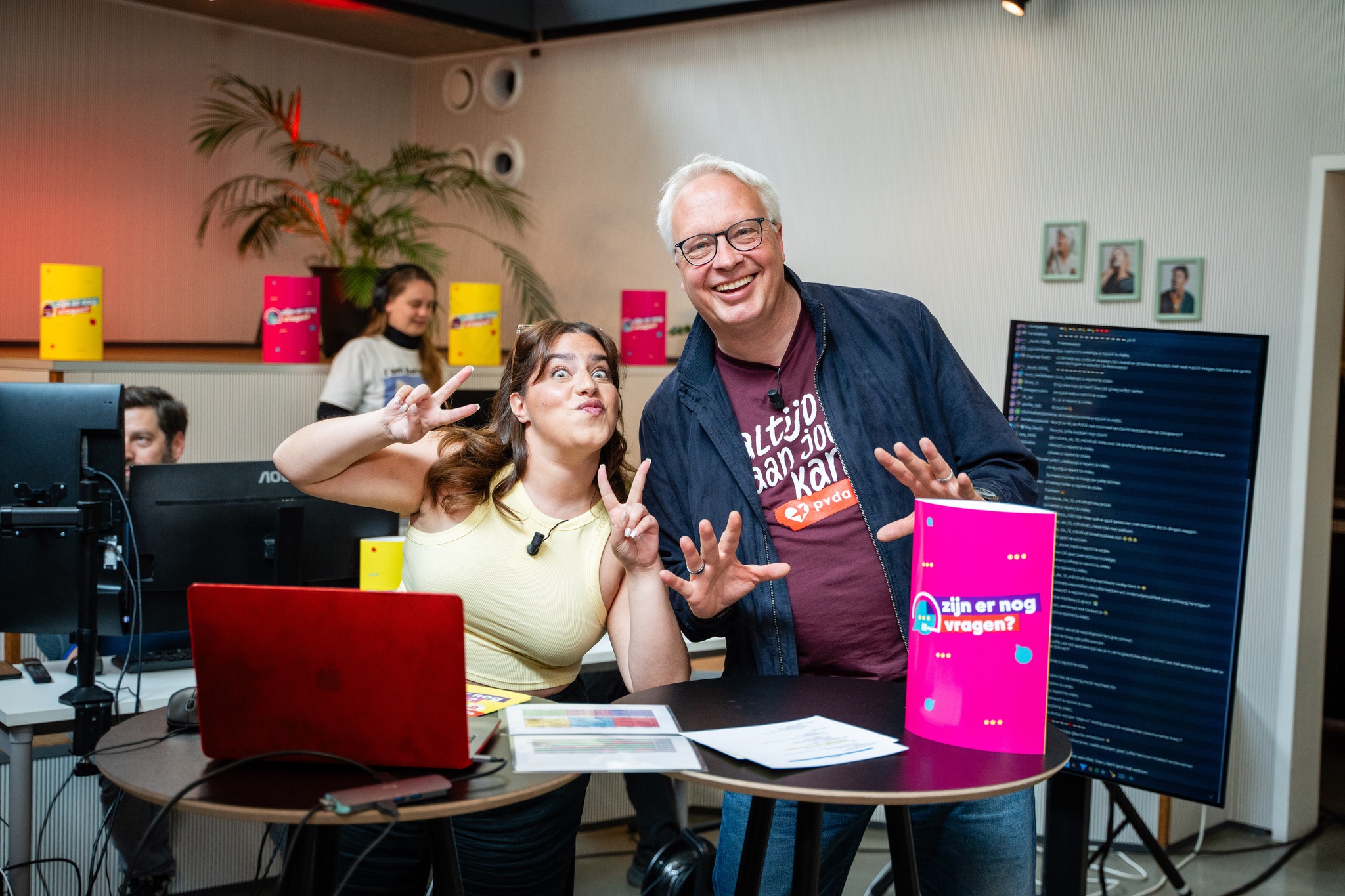 Two weeks after the elections, how would you describe your prevailing mood?
Two weeks after the elections, how would you describe your prevailing mood?
Peter. A feeling of satisfaction, first and foremost, because we have gone from strength to strength. One newspaper wrote: "The Marxists have conquered a place in our country." Another said: "We thought the PVDA-PTB would disappear after five years in Parliament." Well, that's not the case. We have gone from 38 to 50 elected MPs across all parliaments At the federal level, we have risen from 12 to 15 MPs, whilst we have gone from one to two elected MPs in the European Parliament.
This outcome has only been possible thanks to the formidable team that makes up the PTB. There is a great sense of "togetherness" in our party. More than 20,000 people - members and supporters - contributed to our campaign. That's something I'm very proud of. Everywhere, this team has shown dynamism, optimism and enthusiasm. On the Saturday just before the vote, some people even told me they were sorry the campaign was over. [Laughs]
What are the main conclusions to be drawn from the party's results?
Peter. Firstly, the party's progress across the country. We are now the fourth largest party in Parliament. We obtained 763,340 votes. That's an increase of at least 200,000 votes since 2019. One in ten Belgians votes for us.
These new voters come mainly from the country's industrial areas. This was already the case around Charleroi and Liège, where we remain very strong with scores in excess of 20%. This was also the case in Zelzate, the industrial area of Ghent, where we have strengthened our position. A number of other industrial areas have been added: these include the working class of the municipalities of Limburg around Genk and Maasmechelen, where we are experiencing strong growth.
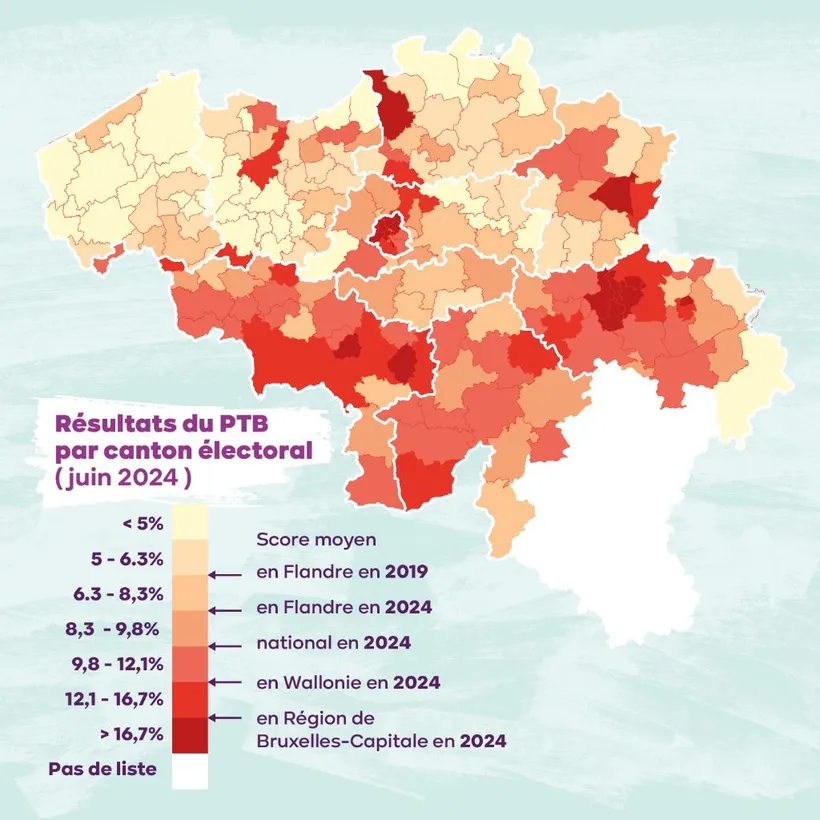 The historic Antwerp-Brussels axis, which has traditionally been a red bastion is now also turning red once again thanks to the PVDA-PTB, with scores of up to 18% in Boom. From there, the red wave continued on to Mechelen, Vilvoorde, Machelen and finally Brussels. In municipalities where the majority of the population is made up of working class men and women, we obtained very good results. Compare this, for example, with the progress of Vooruit, the Flemish socialist party. It too is making headway in Flanders, but more so in the wealthier municipalities.
The historic Antwerp-Brussels axis, which has traditionally been a red bastion is now also turning red once again thanks to the PVDA-PTB, with scores of up to 18% in Boom. From there, the red wave continued on to Mechelen, Vilvoorde, Machelen and finally Brussels. In municipalities where the majority of the population is made up of working class men and women, we obtained very good results. Compare this, for example, with the progress of Vooruit, the Flemish socialist party. It too is making headway in Flanders, but more so in the wealthier municipalities.
We are the party of the broad working class, and this is reflected in these votes and the working class MPs we send to the country's parliaments. Among the 50 elected PVDA-PTB MPs, there are 18 workers.
The party has also succeeded in winning over young people. How has this been possible?
Peter. Yes, that's a second element. Political scientist Dave Sinardet once remarked: "The PVDA-PTB is very good at attracting young people." And this is also reflected in the young people we send to the parliaments. Twelve elected PVDA-PTB MPs are under 35, and seven are under 30. We achieved this result on issues that are important to young people, such as public transport. Most of the other parties remained very silent on this subject, but it was one of the points that Jos D'Haese, our group leader in the Flemish Parliament and the most popular politician on TikTok, managed to put forward incredibly well in Flanders.
So we had topics and personalities that appealed to young people, as well as very active youth movements, namely RedFox and Comac. All this enabled us to achieve very good results among young voters. Un Brussels, we are well and truly the party of the young people. A survey shows that we are well ahead among first-time young voters in the capital: 29% compared with 9.7% for the MR (right-liberal party). An analysis carried out by De Tijd newspaper shows that most of our new votes come from municipalities with the youngest populations. And this is the case in Flanders, Wallonia and Brussels. MR and Les Engagés (centre-right party) secured most of their new votes in municipalities with the oldest populations.
What do you make of the overall election result?
Peter. Firstly, that governments across the board were severely punished. Nobody seems to dwell on it much, but the federal government actually lost 12 seats whilst the Flemish government lost 14. This goes to show that there is a growing appetite for change throughout the country. And this comes across in different ways. To a certain extent, the trend is moving in our favour in Flanders and Brussels, but on the Walloon side, it's also moving towards centrist parties like Les Engagés or a radical liberal party like MR.
Many feared that Vlaams Belang (far-right party) would become the largest party in the north of the country, but that hasn't happened.
Peter. We're taking votes away from Vlaams Belang, especially in urban areas where we're winning over an increasing number of workers and young people. It is thanks to us and not to the N-VA (right-nationalist party) that Vlaams Belang didn't achieve a better score in these areas. So yes, I'm glad that it's partly thanks to us that Vlaams Belang hasn't become the biggest party.
The party is clearly among the winners of the elections in Flanders.
Peter. Absolutely. In the Flemish Parliament, we have increased the number of seats from four to nine. That's more than double. For the first time in our history, we also won seats in Flemish Brabant and West Flanders. We now have elected representatives from all the Flemish provinces. And as a matter of fact, we have contributed to strengthening the left in the process. In Flanders, the left as a whole has achieved its highest score in thirty years, at 29.5%. This is thanks to the rise of the PVDA-PTB, which has really been the driving force of the left, by managing to put left-wing issues such as the millionaires tax at the heart of the election campaign, and has prevented the right and the far right from imposing their themes alone.
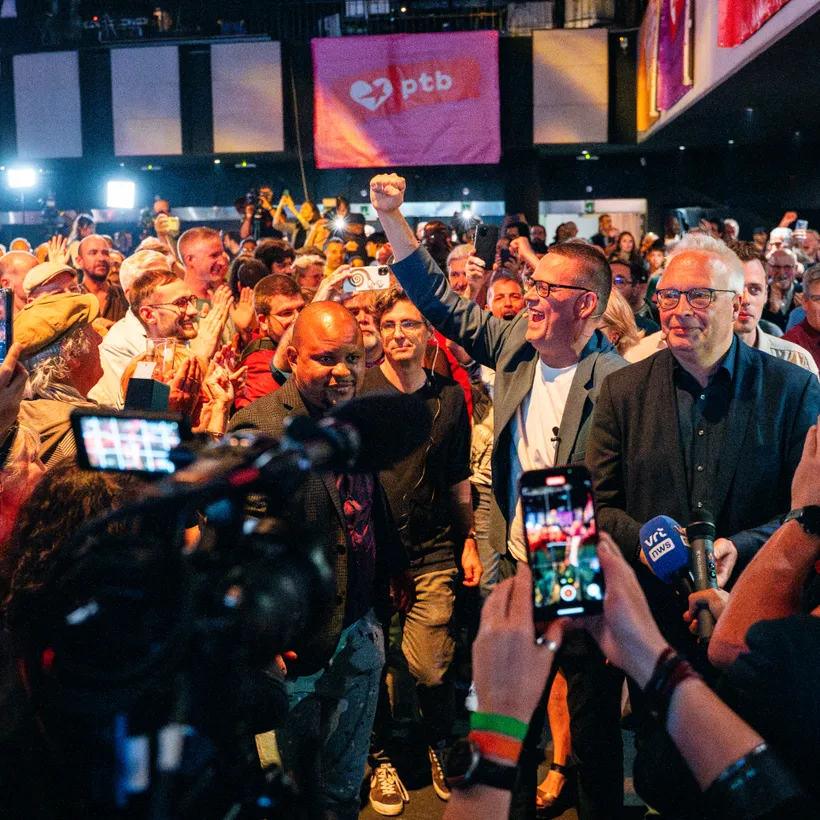 Now let's talk about Antwerp. Everyone, across the political spectrum, was astonished by our good results. Were you too?
Now let's talk about Antwerp. Everyone, across the political spectrum, was astonished by our good results. Were you too?
Peter. Indeed, 22.9% in the city of Antwerp is clearly a historic outcome. We're the second party there. I was also surprised to see that the gap between us and the leading party, the N-VA, was so small. They are down to 25.4%. Bart De Wever has suffered his second biggest defeat in the city where he is mayor.
There really is a big wave of people coming over to the PVDA-PTB. We're achieving good results across all the constituencies. We already knew that we were popular among younger voters, but we're also doing very well among the older ones. Across all age groups, in fact. We can truly speak of a groundswell in our favour.
Also leaving Vlaams Belang behind.
Peter. Yes, we've significantly overtaken Vlaams Belang. They're still at 15.8%, and we're at 22.9%. We've received a lot of messages about this over the last few days. The fact that we have overtaken Vlaams Belang by such a large margin is a sign of hope for the future. Antwerp has always been a political laboratory. This is after all the city where Vlaams Belang - formerly Vlaams Blok - and the Greens originated.
Today, we can see that the PVDA-PTB has enormous potential for growth. And this goes for the entire country. We are showing that a proactive left that addresses people's concerns, that comes up with a strong social programme, is able to win the hearts of the working class and young people and push back against the right and the far right.
And perhaps run the city after the municipal elections in October?
Peter. I do believe that something is possible with the three left-wing parties in Antwerp (PVDA-PTB, Vooruit (social-democrats) and Greens). The result currently gives us a total of 46% of the vote. The people of Antwerp want change. The city is experiencing a huge social crisis. You only have to look at the housing crisis, but there are also problems with public transport everywhere.
We're also receiving signals from the social movements, which wants something different from Bart De Wever's antisocial policy. So there is a strong yearning for change in Antwerp among large sections of the population. Not only among the working class and the young people, but also among the middle classes and the liberal professions.
Another place where we achieved very good results was in Brussels. In the European capital, the PVDA-PTB obtained 20.9% of the vote. That's surprising, compared with the rest of Europe.
Peter: Indeed. Foreign journalists are starting to wonder what's going on in the capital of Europe. Imagine if Marxists won 20.9% of the vote in Washington. Everyone would be wondering: "What's going on?" We have gone from 11 to 16 elected members of the Brussels Parliament and we are currently the third largest party in the capital.
However, this is not just about Brussels. This is about our party's DNA: it's about our party branches in the different municipalities of Brussels who have worked really hard over the last few years. We've formed fantastic new groups and created party branches all over the place, with incredibly dynamic people: young people, women, workers, taxi drivers, bus drivers and so on. And what a campaign they've run!
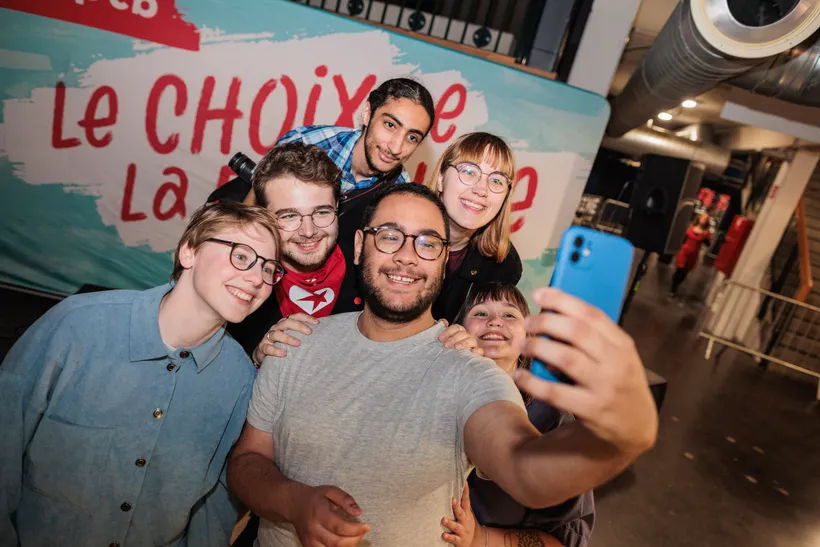 In Brussels, however, the campaign was slightly different from other cities.
In Brussels, however, the campaign was slightly different from other cities.
Peter. One of the reasons we won in Brussels was that we told things as they are. On the one hand, with a sense of pride in Brussels: an attitude diametrically opposed to that of the bitter separatist parties, which do nothing but look down on Brussels.
We also addressed the social crisis head-on. Brussels is experiencing the biggest housing crisis in the country. The Brussels Region is an underfunded region that is almost financially broke because of political games being played at other levels.
Our campaign focused on breaking with current policies. Our slogan in French was "Le choix de la rupture" ("Making a clean break"). In other words, the choice of radical change. One in five Brussels residents voted for us, and that vote represents the hope for real change in Brussels. I am delighted that we represent this hope. I am absolutely delighted that we embody this hope.
Didn't an issue like the war in Gaza play an important part?
Peter. The PVDA-PTB has been active on the Palestinian issue since it was founded 40 or 50 years ago. And it still is today. I think people respect that. But I don't think that's one of the main reasons why they voted for us. I think they see the PVDA-PTB as the party that systematically sides with them, including on the issue of Palestine. It is actually since March 2023 that the polls have been pointing to the significant rise of the PVDA-PTB in Brussels. In other words, long before the war in Gaza.
We highlighted our own social issues throughout the campaign, as we did throughout the country. We saw that the issue of purchasing power and tax justice were priorities for everyone. Anger at the culture of privilege in politics is widespread. Everywhere, people want social solutions for the climate as well as high-quality, affordable public transport. It was the same in Brussels, Wallonia and Flanders.
I think that many people in working class neighbourhoods - including those from immigrant backgrounds - are above all concerned about the housing crisis, mobility problems, the issue of retirement age... and they want solutions.... They voted for us because they're workers or young people, and we address their problems head-on.
In some areas of Brussels, the PVDA-PTB is even the leading party.
Peter. That's right. This is particularly true of Anderlecht, Molenbeek and Saint-Gilles. In quite a few other municipalities, we're in second place. This means that we will also have important responsibilities after the municipal elections next October. Clearly, Brussels voted for hope, for radical change. And this signal must be heard.
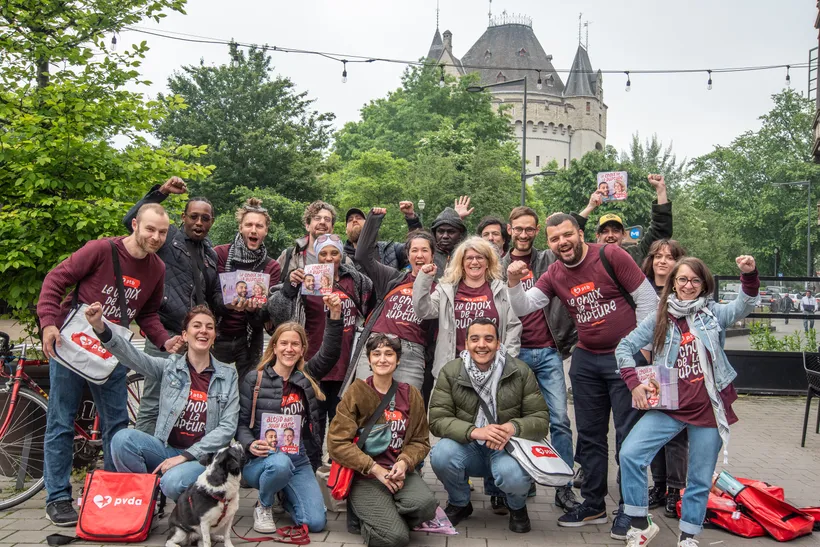 The party is experiencing strong growth in Flanders and Brussels, but a slight decline in Wallonia. What went wrong?
The party is experiencing strong growth in Flanders and Brussels, but a slight decline in Wallonia. What went wrong?
Peter. Wallonia saw a strong shift towards the centre and the right. We saw a kind of double wave: that of the Engagés, the former Christian Democrats, and that of the right-wing liberals with the MR and its president Georges-Louis Bouchez. These two parties each won 10%, and we can see that all the other parties are in decline in Wallonia. Ecolo was particularly hard hit, with a loss of 7.5%. The PS lost 3%.
We are the most resilient party on the left. We lost 1.6% overall in the Walloon region. In rural areas, we've lost a little more, but in the more industrial towns, we're holding up relatively well, with scores of between 15% and 20%. That's great news. We always do very well in the big cities and with young people.
How is it that MR and Les Engagés have achieved such good results?
Peter. Les Engagés presented themselves as a new party. A lot of people believed it. They call themselves a "neither left nor right" party. A bit like what Macron did in France. It worked.
On the other hand, we can see that Georges-Louis Bouchez's extremely brazen style won him votes. He ran a very aggressive campaign, hitting downwards: on jobseekers, the long-term sick, etc.
Has the French-speaking Belgian left failed to respond?
Peter. First of all, the PS and Ecolo were both members of the federal government, and they continued to defend their record. And in the south of the country - even more than in Flanders - many people were unhappy. The government maintained the wage freeze law. It maintained the pension age at 67. It did not introduce a wealth tax. These are all points on which the left-wing parties in power made great promises during previous election campaigns, but which have come to nothing. The government coalition was quite rightly the object of much dissatisfaction.
What's more, the PS ran a very tough campaign against the PTB. They made almost 20 sponsored videos on social media against the PTB, twice as many as against the MR, while they made no videos against the Engagés. They portrayed important left-wing issues we advance - such as returning the pension age to 65 and revising the law on wage freezes - as unrealistic or impossible goals. They sowed fatalism and prevented workers from believing that a project for social change was possible. Finally, they opened the door to the Engagés, declaring that they would be the best partners to form a progressive coalition.
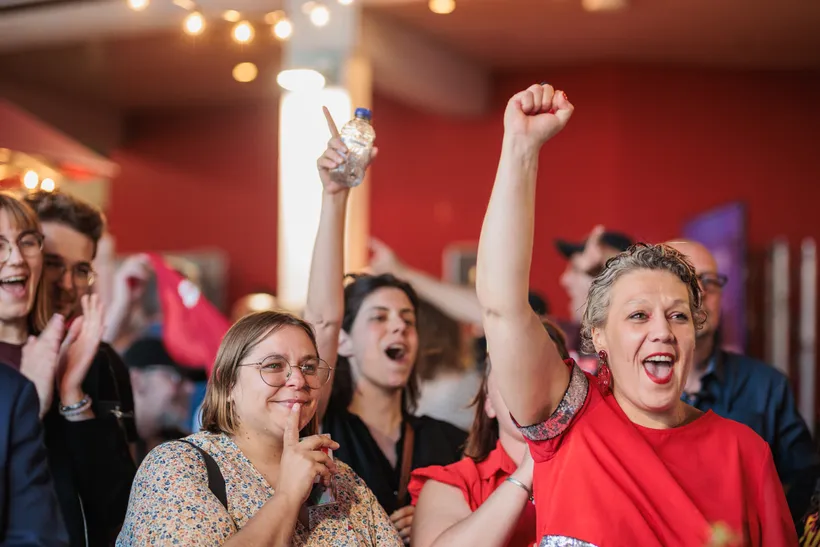 What could we have done better?
What could we have done better?
Peter. We have to be honest: we haven't done enough to win people's desire for change over to our side. This is partly because they didn't see us as THE voice for change. During the campaign, the other parties portrayed us as a party that didn't want to go into government, as a useless vote. This worked against us. We need to look at how we can ensure that the aspiration for change comes back to us, rather than to the Engagés.
The MR has also emerged as a dynamic force in the face of the PS's immobility, even among some of the people who voted for us last time. We failed to show the anti-social nature of the MR. Bouchez presents himself as a sort of Belgian Sarkozy of renewal, but his party has been in power continuously for 25 years. They pushed back the pension age to 67, cut health care and tried to privatise everything they could. They campaigned on the pretext of defending workers' wages and lowering taxes, but it was they who blocked our wages, imposed a temporary suspension of indexation of salaries, and raised VAT on energy to 21% in the past.
Finally, the MR was able to present us as part of the traditional left. We reached out to the PS and Ecolo, and the MR seized the opportunity to present itself as the only force for change. Strange as it may seem, we've lost some of our anti-establishment character to the MR.
So the PVDA-PTB could do better in Wallonia?
Peter. Yes, despite the difficult circumstances - the MR/Engagés double wave - we're doing well thanks to our base in the industrial areas, in big cities and among young people, and gaining ground in some places. This also contributes to the PVDA-PTB's overall progress across the country.
And this is remarkable at a time when a right-wing wave is sweeping across Europe. The PVDA-PTB's success runs counter to this trend.
Peter. That's right. In France, the European elections were marked by a surge of the far right. It almost wiped out President Macron's party, who, in a panic, called for new elections. The French people's disgust with its liberal policy is total. This proves once again that right-wing austerity policies open the door to the far right. This is an important lesson for all future elections.
Much the same thing happened in Germany. The coalition of social democrats, greens and liberals - Germany's Vivaldi, as it were - has also taken a beating. The Green Party's vote was halved, and the far-right AfD won.
Between Germany and France lies Belgium, where this thirst for change was expressed in a more diversified way. The far-right has made progress here too, as have the hard-line liberalism of the MR and the centrist orientation of the Engagés. But what is specific to Belgium is the growth of the authentic left. And it is, I think, a sign of hope and inspiration for the recovery of the left throughout Europe.
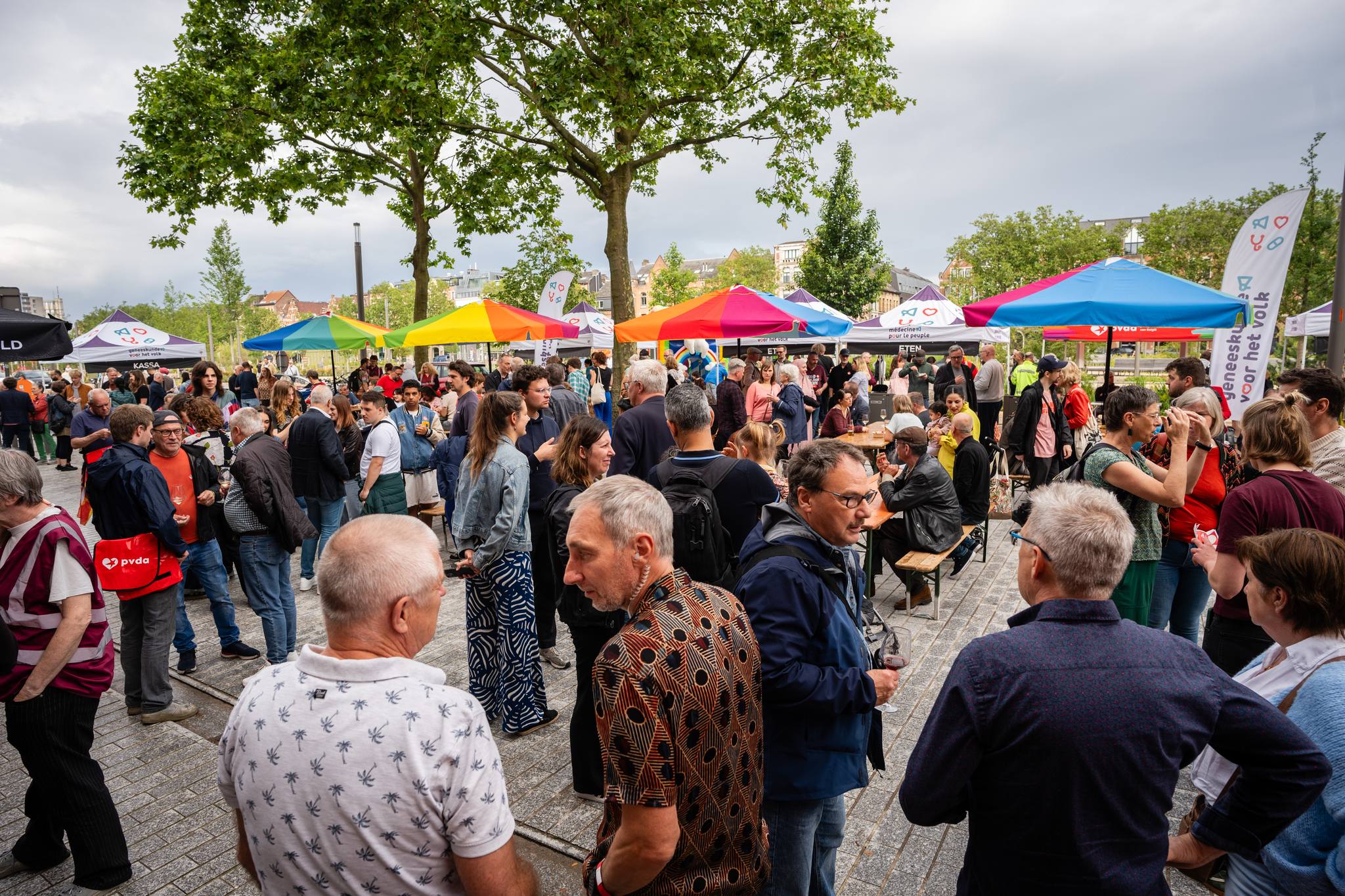 How is it that we succeed where many radical left-wing parties fail elsewhere in Europe?
How is it that we succeed where many radical left-wing parties fail elsewhere in Europe?
Peter. We've always said we wanted to build an authentic party with both feet on the ground. We don't want to become a party of smooth talkers, but rather a party with a strong foothold in working class neighbourhoods. It's our DNA.
Sounds simple, but it's not. In many European countries, classical social democracy has drifted away from working class neighbourhoods. Community centres have closed, brass bands have been disbanded, and the whole socio-cultural life of the political wing of the trade union movement has been progressively suppressed over the last 30 or 40 years.
Reconstructing all this will take a lot of time. We've been working on this since our 2008 Renewal Congress. We decided to keep our backbone: we remain a Marxist party whose compass is oriented towards a socialist society. We're pursuing the necessary dream of a society free from the exploitation of human beings and the plundering of nature. We believe in the power and dynamism of people to change things, not in place of the people, but with the people. That's why we continue to be out on the ground every day, and despite the obstacles, we're making progress.
So there's no magic solution...
Peter. The magic solution is all our party branches on the ground, with their hands in the mud, working hard every day. Don't be afraid to roll up your sleeves, and be equipped with a solid social compass geared towards socialism. With incredible effort, commitment and hope. We are a party of hope. This is also reflected in the large number of young people who have taken part in our campaign. We give off a positive vibe. For me, there's no such thing as an instant magic potion. Only long-term work can get things moving, and that's what the whole PVDA-PTB team has done, with all its fantastic activists. I wouldn't want to be general secretary of any party other than the PVDA-PTB.
The role of the 2008 Renewal Congress
Peter. This result is a further step in the process we began in 2008 with the PVDA-PTB Renewal Congress. We've been working on this for over fifteen years. Our first breakthrough came in the 2012 local elections in Antwerp, Liège and Brussels. In 2014 and 2019, we also broke through at federal and regional level. Today, we are witnessing not only the consolidation of this progress, but also new advances.
During our renewal process, we drew up a plan to develop the party. We'd come a long way, and we wanted to build something solid from the ground up. In certain left-wing circles at the time, it was fashionable to make everything dependent on a single personality, so as not to have to build organizations in working class neighbourhoods and workplaces. And yet that's exactly what we've done.
We built a solid stone house. Some build a house of straw, others a house of wood, as in the tale of the Three Little Pigs, but at the first storm, everything collapses. We wanted a brick house. And, admittedly, it took a little longer to build, but it made it easier to withstand the turbulence that was coming our way. And that will always be the case, of course. There are many social, democratic and environmental challenges ahead.
|